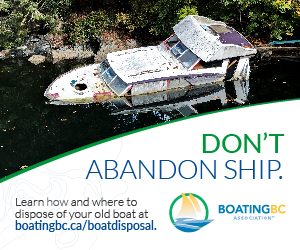Derelict vessels are neglected boats that are often found abandoned or wrecked and are left to decay in the water or on the shore. Whether they are intentionally dumped or sunk by their owners, or simply forgotten and lost, they pose environmental hazards that leach an array of contaminants into the sea, such as oil, fuels, paints, batteries, fiberglass, plastics and other toxins. This puts marine life and habitat at risk, not to mention the danger these vessels pose to mariners and beachgoers and the damage they can cause to shoreline facilities.
Do you have a retirement plan for your boat?
Good captains don’t abandon their ship. So when your boat comes to the end of its useful life, make sure you do the responsible thing and retire it properly. Learn how and where to dispose of your old boat at boatingbc.ca/boatdisposal.
Vessel Reporting
- If a vessel is an immediate and serious threat to public safety (because of fire or explosion) or you’ve seen
suspicious activities. Call local police or emergency services. Dial: 9-1-1. And keep clear from the vessel. - If a vessel appears to have been abandoned or poses a risk to the environment or to the health and well-being of the community. For example, the vessel is in poor condition and could harm the
environment if it sinks. Report it to the Canadian Coast Guard at 1-800-889-8852. - Learn more about how to report a problem vessel.
We need more solutions for vessel abandonment!
Bill C-344 an Act to amend the Wrecked, Abandoned, or Hazardous Vessels Act is currently tabled in parliament.
There are major impediments to addressing these threats to our waters that the current Act doesn’t address, and one is that many of these vessels have no clear or current ownership records making it difficult to track down and hold accountable the people who are responsible for them. More resources are required to address this and to help plan and determine solutions, which includes developing innovative recycling initiatives and a designated vessel turn-in program. The costs and difficulty of removing vessels grow the longer they are left unattended.
We also need cooperation and partnership between provincial governments and Indigenous governing bodies on the implementation of any measures towards this national strategy. The proposed amendment calls for more of this kind of collaboration.
TAKE ACTION and send a letter to your MP and support Bill C-344!
The Wrecked, Abandoned, or Hazardous Vessels Act
This Act came into force on July 30, 2019. Below is a brief overview of the key elements of the bill:
Strengthening vessel owner liability
The bill gives the Nairobi International Convention on the Removal of Wrecks, 2007 force of law in Canada, and further extends it to all Canadian waters. This includes new obligations to report, locate, mark and remove wrecks as well as make vessel owners automatically liable for hazardous wrecks resulting from maritime casualties. Owners of large vessels (300 gross tons or larger) are required to maintain insurance or other financial security to cover the costs of wreck removal, should the wreck pose a hazard.
Addressing irresponsible vessel management
The bill prohibits vessel owners and operators to:
- Abandon their unwanted vessel.
- Cause their vessel to become a wreck because they fail to maintain it.
- Sink, strand or ground their vessel on purpose.
- Without being authorized, leave their vessel in poor condition in the same area (within a radius of three nautical miles) for more than 60 days.
- Leave their vessel adrift for more than 48 hours without taking measures to secure it.
Empowering the federal government
The bill empowers the federal Government to take proactive measures to prevent, mitigate or eliminate hazards posed by vessels or wrecks including directing and holding the owner to account.
Learn more about the Wrecked, Abandoned or Hazardous Vessels Act.

